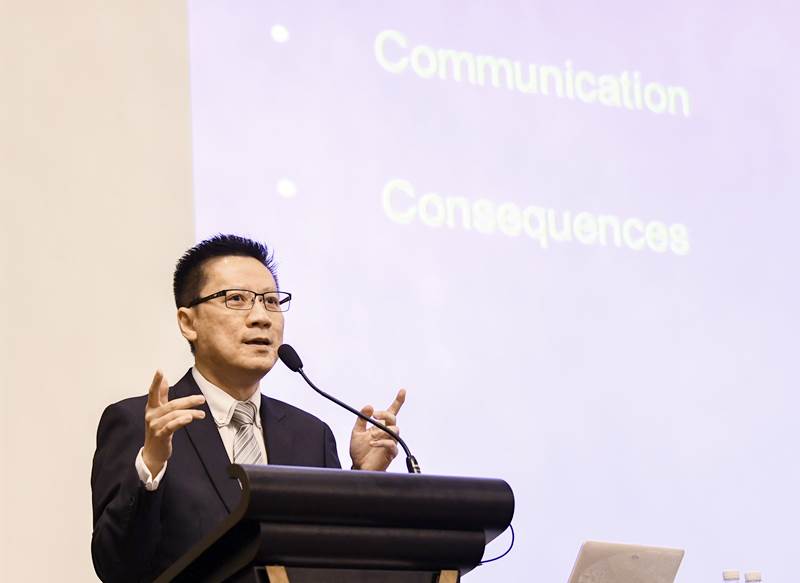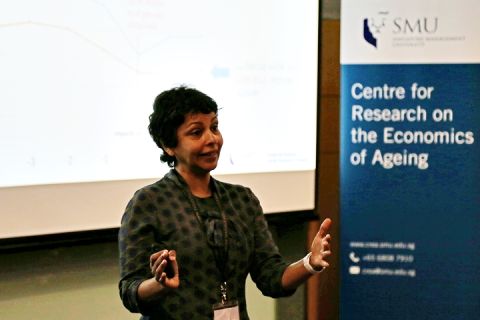
Back to Research@SMU Events Feature Series
By Sim Shuzhen
SMU Office of Research & Tech Transfer – Under the three-strikes laws enforced by a number of US states, individuals who already have two or more prior convictions can be given an extremely severe prison sentence upon being convicted for a third time. In some cases, this can mean life imprisonment, even if the third offence is relatively minor.
Instead of acting as a deterrent, three-strikes laws have actually been linked to an increase in violent crime, especially against law enforcement officials, said Professor David Chan, Director of Singapore Management University’s (SMU) Behavioural Sciences Institute (BSI). This unintended consequence arises because offenders have a lot to lose, and thus fight tooth and nail not to be caught a third time.
“When you blindly apply a rule like this, you can actually cause injury,” said Professor Chan, who was speaking on 24 February 2017 at BSI’s conference on the theme of ‘Unintended Consequences in Singapore’.
While lawmakers probably did not expect three-strikes to backfire, not all unintended consequences will come as a surprise, said Professor Chan. In some cases, policy-makers anticipate them, but choose to implement the policy anyway because they judge that it will have a net positive effect. This has important implications for how policy is communicated to the public, he added.
A tough balancing act
“We tend to think that unintended consequences occur because we live in a VUCA (volatile, uncertain, complex and ambiguous) world,” said Professor Chan. “But I would suggest that unintended consequences are not predetermined, and neither are they random. They are to some extent within our control, and we can plan for them.”
In fact, most unintended consequences were likely already anticipated by policy-makers, especially in Singapore, he added.
For example, Singapore’s population policies allowed many foreigners into the country, putting a heavy burden on infrastructure and provoking discontent among Singaporeans. Although the extent of the problem might have been underestimated, the government implemented the policy anyway because it judged that the trade-off – the need for labour and economic growth – was justified, said Professor Chan.
Acknowledging the existence of anticipated but unintended consequences, said Professor Chan, allows governments to be honest and transparent about the thought process behind policies. “The public then recognises that the government was making purposive choices among some alternatives, and that it chose to make a trade-off. And that story becomes meaningful,” he explained.
Even so, this acknowledgment carries some political cost: governments can no longer attribute the unintended consequences to external factors beyond their control. “Because you anticipated it, you now have to justify your choice and be accountable for it,” said Professor Chan. “But I think this is a better approach than letting everybody blame you for unintended consequences that they think were unanticipated – this will cause the public to lose faith in the government’s competence.”
The psychology of public policy
When it comes to communicating policy to the public, psychology is critical, said Professor Chan.
Public perception can differ significantly from policy-makers’. For example, policy-makers may choose to blame negative unintended consequences on an unpredictable world, said Professor Chan. But the public – especially if it does not understand the trade-offs involved – is more likely to blame the government for being incompetent or dishonest, he added.
Likewise, policy-makers may choose to credit a positive or serendipitous unintended consequence to good policy design and execution. But the public is more likely to attribute it to luck, or to take the view that a government with ample resources should be expected to produce such results, he said.
“I want to suggest that policy-makers be quite explicit both to yourselves and to the public about the positions you take,” said Professor Chan. “Policy-makers need to realise that what matters to public is that you must understand their perspectives and perceptions.”
The whole idea of behavioural science is to understand how these perspectives and perceptions drive how the public thinks, feels and acts, he added. This could help build up the public’s trust, which tends to be eroded by the effects of unintended consequences.
Staying open to new ideas
When communicating their policies to the public, governments cannot afford to let themselves be perceived or labelled as paranoid, patronising or parochial. Such “maladaptive” traits will only provoke discontent and mistrust among the public, said Professor Chan.
Instead, policy-makers must take adaptive approaches when dealing with unintended consequences, he said. For example, they should understand that it is possible to proactively prevent negative unintended consequences, while at the same time aspiring to promote positive ones. “It's possible to have a great economy and great cohesion in Singapore – not every critical decision has to be a trade-off,” said Professor Chan.
In addition, in order to adapt to unintended consequences, it is beneficial for policy-makers to be more pluralistic and accepting of a wider range of ideas, said Professor Chan.
“I think we should have a better attitude towards having a diversity of ideas – everybody is still not very good at that, including academics, policy-makers and civil servants,” he said. “The smarter you are, the less open you are to the diversity of ideas, because you have invested so much and are confident in your own ideas. I think many of us are too concerned about being wrong.”
Ultimately, added Professor Chan, no one has all the answers. “At the end of the day, we need to have principles and a social compact, and to be pragmatic at the same time. With that, we can approach and deal with unintended consequences in a much better way.”
See More News
Want to see more of SMU Research?
Sign up for Research@SMU e-newslettter to know more about our research and research-related events!
If you would like to remove yourself from all our mailing list, please visit https://eservices.smu.edu.sg/internet/DNC/Default.aspx

